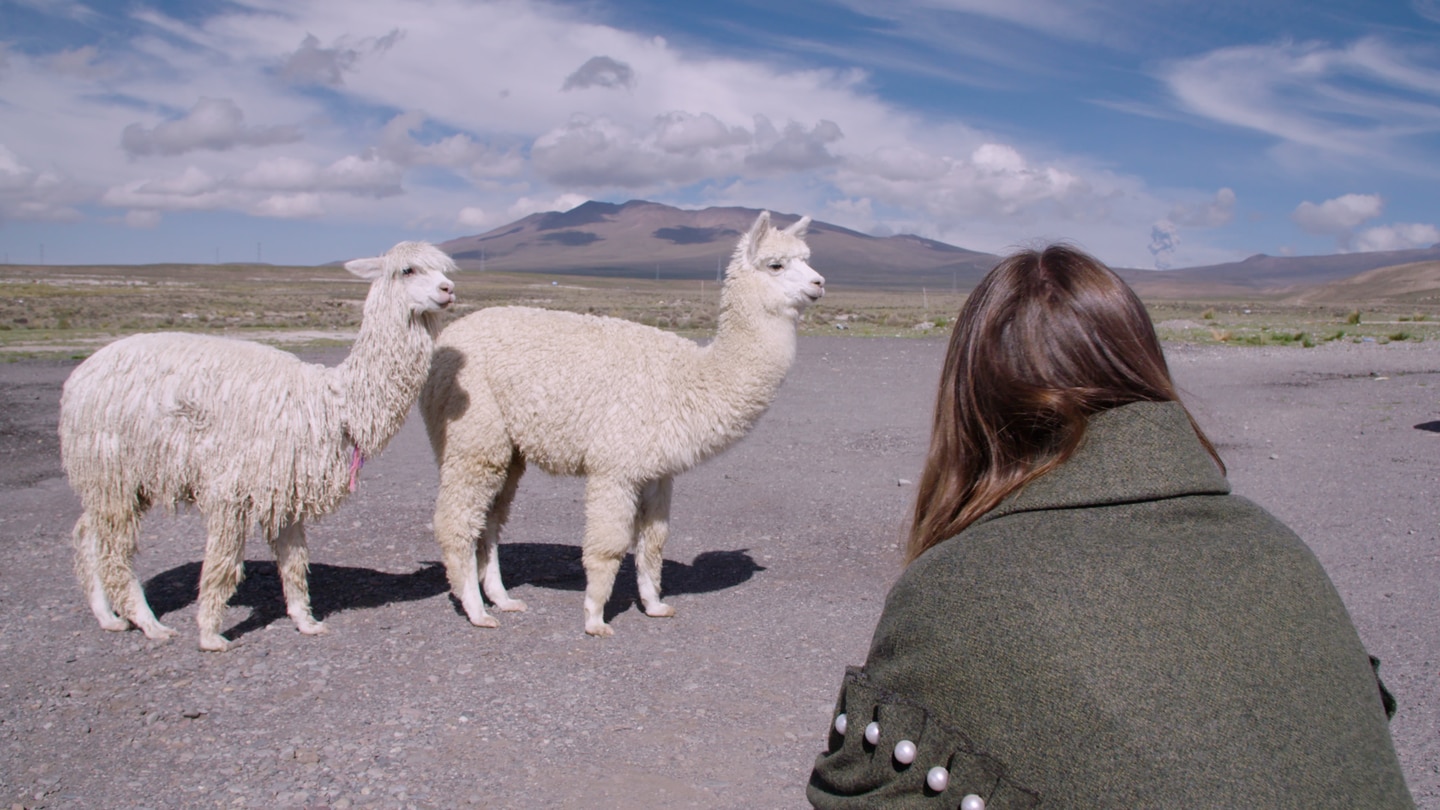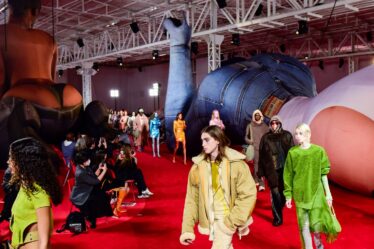
In February 2020, Amy Powney tapped out of the fashion system.
Three years on from winning the prestigious British Fashion Council/Vogue Fashion Fund Award, the Mother of Pearl creative director was an established player on the UK’s fashion scene. But she was done.
Instead of a show, she used that London fashion week to launch a social media campaign focused on raising awareness about fashion’s environmental and social impact. In place of a collection, she launched a nonprofit.
The move came after a years-long effort to try and fit Powney’s vision of a sustainable luxury label into the mainstream fashion scene, beginning with the BFC/Vogue Fashion Fund award in 2017.
Instead of pouring her £100,000 ($122,000) winnings into growing Mother of Pearl’s business, Powney devoted the money to create a collection that was traceable from farm to finished product and made in line with specific environmental and social standards.
That journey is the subject of “Fashion Reimagined,” a documentary by director Becky Hutner that premiers at the start of London Fashion Week on Thursday. It’s a raw and compelling look at fashion’s supply chains and one designer’s quest to really try and do things better against the odds.
“My passion was always to make Mother of Pearl sustainable,” said Powney. “I didn’t even know what that meant.”
Stepping Outside the System
Though Powney is now an established industry iconoclast, she was initially drawn to fashion because she wanted to fit in.
When she was 10, her parents moved the family from their home in a village in northern England to a caravan on a field with no electricity or running water. Her dad sunk a well with a hand pump. To shower, they’d heat water on a stove and he’d run round the side of the caravan to pour it over Powney and her sister.
“Being a different kid — quite chubby, I lived in a caravan — it wasn’t the easiest upbringing for street cred,” Powney said. “I quickly realised at high school that I was at the bottom of the pile, but if I bought a proper [Adidas] tracksuit, I changed my place … at that moment I became quite obsessed with fashion.”
At university, Powney read Naomi Klein’s anti-consumerism book ‘No Logo,’ opening her eyes to the exploitation embedded in the fashion sector. “It completely pivoted me in my brain about where I was and where I wanted to go,” Powney said. “I knew I wanted to go into things in a different way.”
Her graduating collection was focused on organic and ethical designs, topics that barely featured in the fashion conversation in the mid 2000s. Activist designers and pioneering labels like Katharine Hamnett and People Tree were trying to push more responsible business practices, but they operated on fashion’s fringes. “The tutors were just a bit baffled by me,” Powney recounts in the documentary.
When she graduated in 2006, the number of roles in the industry with any kind of link to sustainability were vanishingly small. But Powney landed a job as an assistant at Mother of Pearl, the British brand founded by designer and Damien Hirst’s former partner Maia Norman in 2002. The label wasn’t doing anything particular to operate more responsibly, but it was small and independent and had good relationships with its suppliers. It wasn’t “a big monster in the field,” said Powney.
By 2015, the designer had worked her way up to become the label’s creative director, building a cult following among celebrities and fashion editors for her feminine and effortlessly wearable designs. But by that point, she was also caught up in the demands of the fashion cycle, designing upwards of 700 garments in a year.
The BFC/Vogue Fashion Fund Award in 2017 was a chance to change that, giving Powney the funds and confidence to make good on bold ambitions to do things differently. As a start, she changed the brand’s retail model, shifting back to just two collections a year. And then she turned her attention to her supply chain.
“It was a very gut instinct and emotional decision, rather than a CEO trying to grow the brand,” said Powney. “Genuinely at the time, I didn’t want to carry on the way I was.”
‘A Can of Worms’
Powney’s mission was to create a collection that was completely sustainable from start to finish — or as close to as possible. No Frills, a tongue-in-cheek reference to supermarket value lines, would be socially responsible, organic, traceable, use minimal water and chemicals, consider animal welfare and be produced in the smallest geographic region possible.
It was, as it turned out, an almost impossible task.
The journey, chronicled fly-on-the-wall style in “Fashion Reimagined,” takes Powney and her brand manager Chloe Marks to Austria, Uruguay, Peru and Turkey in search of fully traceable wool and cotton supply chains. Again and again they run up against a system that isn’t built to work that way, with little more to guide them than Google and a determination to see their ambition through.
“It was just opening this giant can of worms and every step we went down the link opened up another issue,” said Powney. The result is an honest, fascinating and sometimes surreal inside-look at how fashion operates and why it’s so hard to reset the system. At one point, Mother of Pearl’s Marks runs through her to-do list for the day: “Item one: order 20 metres of fabric, item two: check Isis affiliation of Turkish cotton, item three: order more zips.”
One of the most telling moments of the film is when Powney takes the collection to Paris for pre-season sales. A revolving cast of buyers finger pearl-embellished jacquard coats and jacquard and frilled striped cotton shirts with complete indifference to the painstaking work required to source them. One pair of buyers dismisses the idea of marketing the line’s sustainability credentials because “it’s just so small to our total business.” Things might be different if more brands were doing it, they add.
When the collection first launches, “it just bombs,” said Powney.
But the industry was changing, and by the time No Frills was launched at London Fashion week in September 2018, sustainability was becoming one of the industry’s big talking points and Powney was poised to step into that conversation.
Fashion Reimagined
Though the film leaves the brand on a high note, the reality is more complex. Powney has expanded the work she did on No Frills across the brand, but maintaining standards across the supply chain requires constant effort.
“We don’t make anything now that doesn’t have a raw material or supply chain that we feel confident about,” said Powney. Every garment is listed with a transparent run down of how it fulfils the brands sustainability ambitions, from the level of traceability achieved to types of fibres used.
It’s still far from a perfect system. Many fabrics still can’t be traced back to the raw material level. Powney and her team try and vet things in person wherever possible and ask detailed questions to cross check any sustainability claims, but often the best they can do is rely on existing certification schemes.
“You have to be like a detective all the time,” said Powney. She’s learnt that the hard way. She had to put out a recent collection of black denim that didn’t meet her commitment to use organic cotton because when she’d pushed her supplier to produce the certificates proving the material’s credentials, they couldn’t (Organic certification itself has been the subject of massive fraud in recent years). “If I don’t sell it, it’s just a waste,” she said.
The business itself is solid and growing steadily, Powney said, though a shift away from wholesale means turnover is lower than it was before the pandemic. At the moment roughly a third of the brand’s business is direct-to-consumer and the aim is to keep growing the focus on direct channels with control over pricing and messaging. Going forward, Powney also wants to do more to explore alternative models like rental and resale. She’s never going back to the way things worked before, she said.
“A lot of the noise and advertisement and circus of fashion, I’ve fallen out of love with it a bit,” said Powney. Her focus is on making clothes that make women feel empowered and using her platform to push change in the industry. “[I feel] like I have a duty now.”
‘Fashion Reimagined’ launches in cinemas March 3 and is available on Sky Documentaries and streaming service NOW from April 9.
For more BoF sustainability coverage, sign up now for our Weekly Sustainability Briefing by Sarah Kent.



